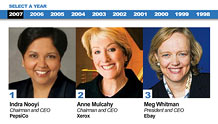When will corporate women rise higher?A 50-something reader who found she couldn't 'have it all' asks if her daughter can expect better career rewards. Fortune's Anne Fisher explains whether to offer the next generation a reality check, or to keep quiet.(Fortune) -- Dear Annie: I have worked in big companies, mostly in financial services, for the past 32 years. (I'm 55 now.) I've been laid off twice, bounced back both times, and raised three kids. I entered the workforce with high hopes - I guess we were the first generation of women who thought we could "have it all" - but my career has never advanced as far as I had thought it would and, looking back, I have to say I'm disappointed, because the tremendous effort, dedication, and sacrifice I've put into my work has never really been rewarded. Now, my 24-year-old daughter is gung-ho about having both a high-powered career and a family. I would like to warn her that combining these two things is not going to be easy, but I don't want to discourage her from trying. Should I offer a reality check, or just keep quiet and let her figure it out for herself? -Monterey Mom 
Interactive graphic
In honor of the 10th edition of Fortune's Most Powerful Women list, we're looking back at who made the top 3 each year.
See them all Dear Monterey: The first thing you might want to do is get her a copy of Women Confidential: Midlife Women Explode the Myths of Having It All (Marlowe & Co., $15.95), in which more than 1,000 women share their thoughts and experiences - many of which parallel yours. "I wrote the book because I met so many women who, at midlife, were doing a lot of reassessing, and many of them were dispirited with corporate life," says author Barbara Moses, Ph.D. (www.bmoses.com), a veteran career coach and human resources consultant. "I wanted these women to know that they're not alone, that other people are thinking about the same issues." Of course, Moses notes, it's not only women who may be looking back in their 50s and feeling their hard work hasn't paid off. "It's a common feeling among both men and women these days," she says. "Since the mid-'90s at least, employers have demanded more for less. Competition for rewards - money, promotions, perks - has intensified, and many men also feel their hard work has been undervalued and underappreciated." For women, though, the conflict between career and family has complicated matters. "With productivity demands at work increasing all the time, the bar is set very high," Moses observes. "Just the other day, an HR person said to me, 'If I'm going to promote someone, it isn't going to be a part-timer.' Yet, if you are always front and center at work, will you be the kind of parent you want to be? One of the biggest regrets among the midlife women I interviewed who were very career-focused was the major events in their kids' lives that they missed." Don' t men struggle with this, too? Moses thinks not: "Of course men love their kids, but their sense of identity and well-being isn't tied to their children in the same way." Think that's an inflammatory statement? How about this one: "I really don't think it's possible to 'have it all,' " Moses says. "At least not all at once. A more realistic approach would be to think in terms of life chapters, that is, alternating between giving priority to career and family. As time goes on, your daughter is probably going to find that one or the other is going to take a back seat. And there is nothing wrong with that. The women I interviewed who had made tough choices, including choosing family over work at some stage, were the ones who ended up the most satisfied with their careers and their lives." So, if you decide to sit your daughter down and discuss this, what should you say? "The one thing you don't want to do is project your own disappointment onto your daughter," Moses says. "Say something like, 'I think it's great that you want a serious career and a family, but be open to change. You don't have to decide right now what you want to do for your whole life. From what I've seen, though, it's going to be really difficult to have that big powerful 80-hour-a-week job and still have enough time and energy for a family.' As long as you don't say it in a bitter or blaming way, it's fine." Moses adds: "Don't forget, your daughter saw you get laid off and bounce back. She saw you struggle to make time for everything all those years. So she's probably already aware of some of the obstacles and risks without your having to say anything at all." One further thought: The world is changing, even if slowly. Many more companies are making a real effort to help employees juggle the various parts of their lives (see my Sept. 25 column). Moreover, as the economy expands over time, so do opportunities. When recruiting firm Korn/Ferry International surveyed executives a few months ago and asked them to compare today's career opportunities with what was available when they were starting out in their 20s, 64% said that far more and better opportunities exist today. Thanks in large part to your generation's efforts, that's especially true for women. Has your career turned out the way you hoped, so far? Would you advise someone just starting out in your field to follow in your footsteps? Do you think women starting careers today will advance further? Post your thoughts on the Ask Annie blog. |
| |||||||||||||||||||||


